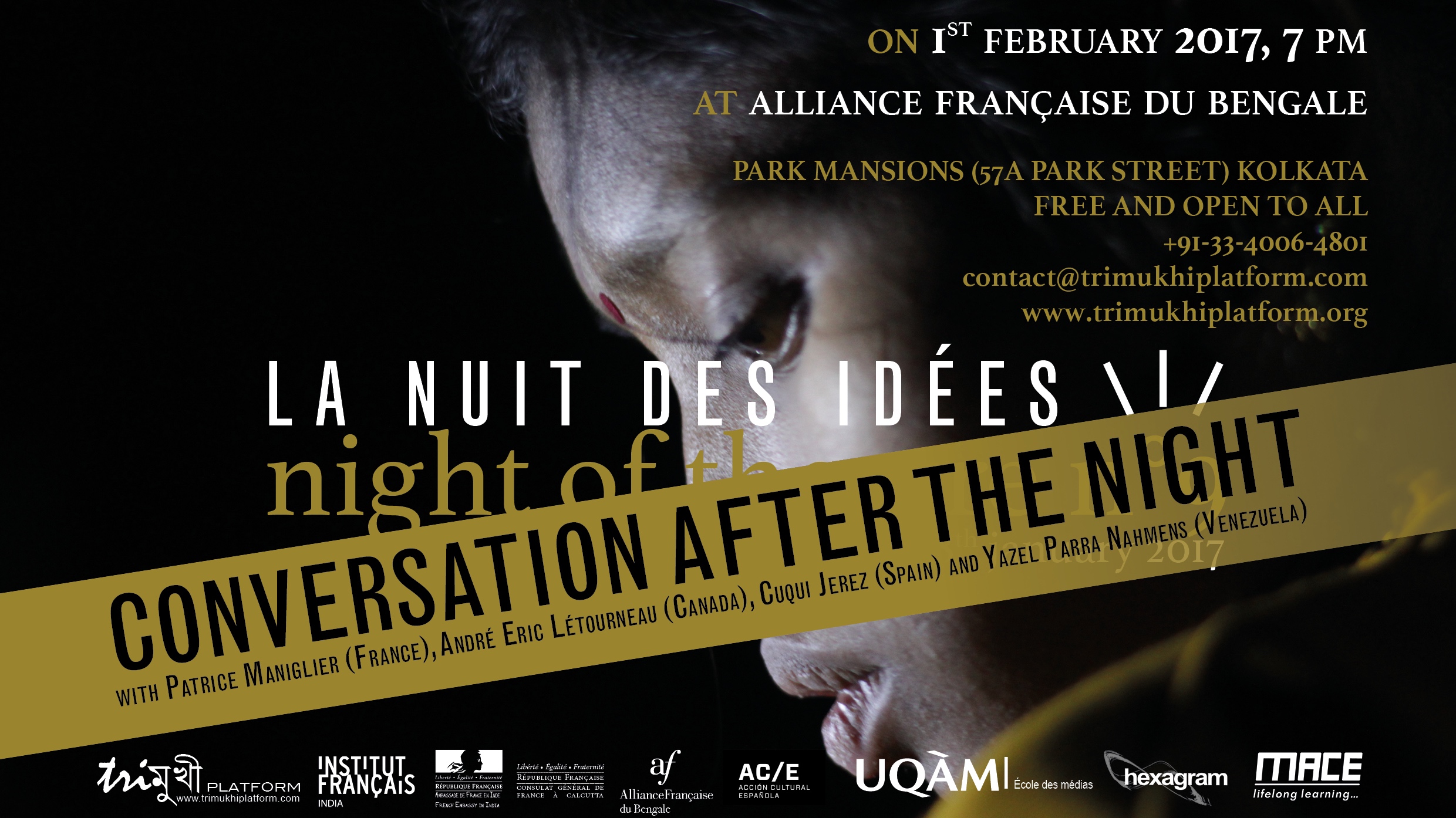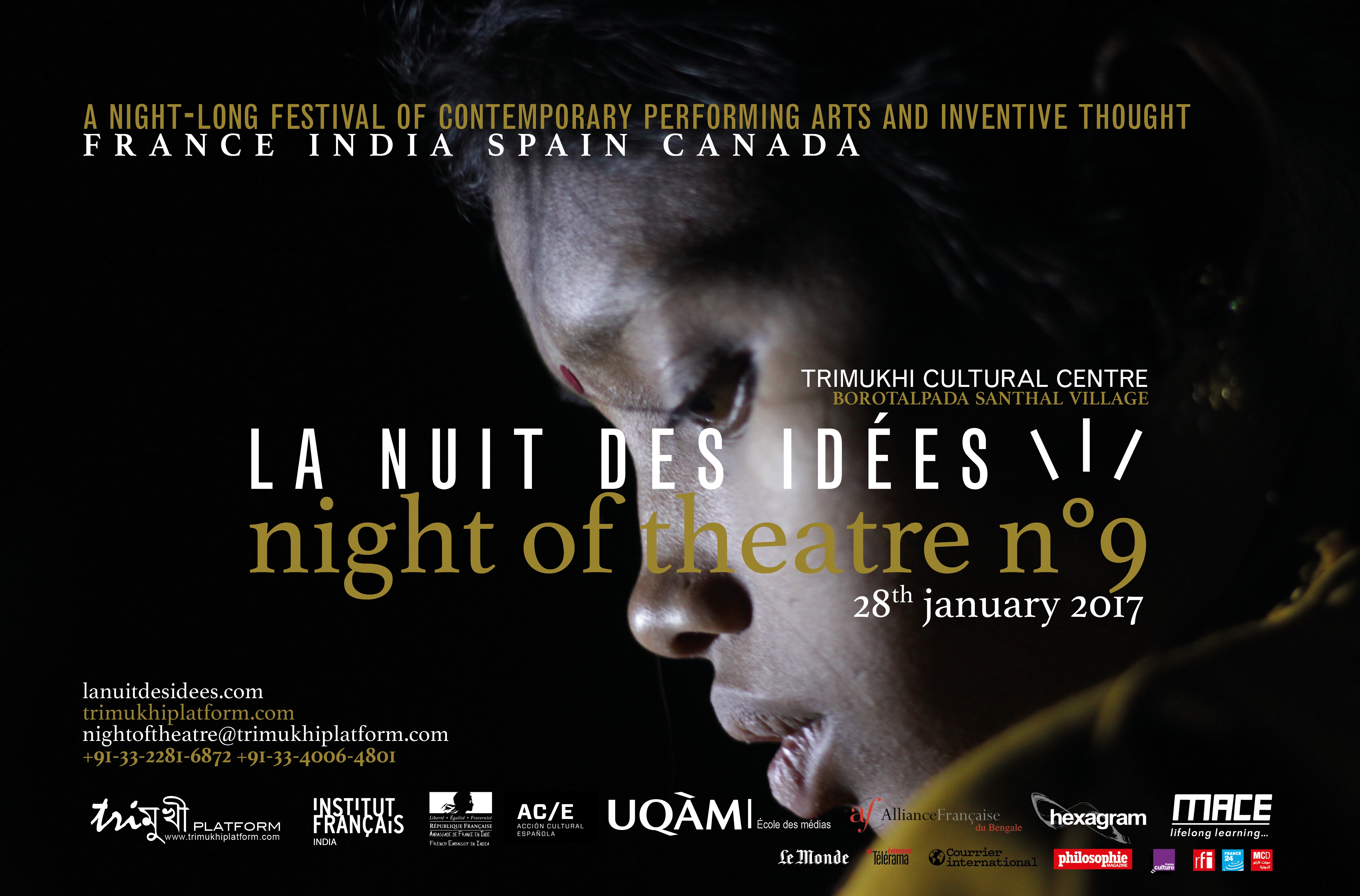The Night of Theatre n°9 • La Nuit des idées, a night-long festival of contemporary performing arts and inventive thought, took place on Saturday 28th January 2017 at Trimukhi Cultural Centre in the Santhal tribal village of Borotalpada, West Bengal, India. Artists and scholars from Kolkata, Paris, Madrid and Montréal, together with Santhal actors, dancers and musicians both showcased in situ performances and evolved in stimulative conversations about art and thought. The night-long program ended with a joyful multicultural dance party.
![]() WITH Jean-Frédéric Chevallier [Paris, Kolkata] Samantak Das [Kolkata] Cuqui Jerez [Madrid, Berlin] André-Éric Létourneau [Montréal] Patrice Maniglier [Paris] Yazel Parra Nahmens [Caracas, Barcelona] Sukla Bar [Kolkata] Bhudray Besra [Chaulbata village] Motilal Hansda [Borotalpada village] Surujmoni Hansda [Borotalpada village] Chandrai Murmu [Bhangabhandh village] Sunandan Roy Chowdhury [Kolkata]
WITH Jean-Frédéric Chevallier [Paris, Kolkata] Samantak Das [Kolkata] Cuqui Jerez [Madrid, Berlin] André-Éric Létourneau [Montréal] Patrice Maniglier [Paris] Yazel Parra Nahmens [Caracas, Barcelona] Sukla Bar [Kolkata] Bhudray Besra [Chaulbata village] Motilal Hansda [Borotalpada village] Surujmoni Hansda [Borotalpada village] Chandrai Murmu [Bhangabhandh village] Sunandan Roy Chowdhury [Kolkata]
![]() PRESENTED BY Trimukhi Platform, Institut Français in India AND French Embassy in India IN PARTNERSHIP WITH Alliance Française du Bengale, Ecole des Médias de l’Université du Québec à Montréal (UQAM), Acción Cultural Española AC/E, MACE, Hexagram
PRESENTED BY Trimukhi Platform, Institut Français in India AND French Embassy in India IN PARTNERSHIP WITH Alliance Française du Bengale, Ecole des Médias de l’Université du Québec à Montréal (UQAM), Acción Cultural Española AC/E, MACE, Hexagram
| Full programme in PDF → |
| Press on Night of Theatre → |
THE NIGHT IN DETAILS
BEFORE THE NIGHT • PHILOSOPHICAL CAPSULES what is art? what is thought?
capsule 1 “What is art?” written and read by Jean-Frédéric Chevallier capsule 2 “What is thought?” written and read by Patrice Maniglier translation from the French by Fui Lee Luk
ATANG DARAM• PSYCHOGEOHÖRSPIEL II santhal welcome + radio art manœuvre
santhal ritual performed by Delkho Hansda, Falguni Hansda, Laxmi Hansda, Parboti Hansda, Panmoni Hansda, Sombari Hansda, Mado Hembrom, Shaloti Hembrom, Chinta Soren, Kapra Soren and Sukmoni Soren sound art manoeuvre directed by André Éric Létourneau in collaboration with Sukla Bar Chevallier sounds and voices recorded by Bhudray Besra, Chintamoni Hansda, Dhananjoy Hansda, Dhani Hansda, Dulal Hansda, Joba Hansda, Ramjit Hansda, Sukul Hansda, Surujmoni Hansda, Chandrai Murmu live sound interventions by Chintamoni Hansda, Dhani Hansda, Dulal Hansda, Joba Hansda, Ramjit Hansda and André Éric Létourneau
BURU JATRA santhal dances + words of welcome
music and dance by Chita Hansda, Delkho Hansda, Falguni Hansda, Ganesh Hansda, Kanai Hansda, Laxmi Hansda, Parboti Hansda, Parmoni Hansda, Patoram Hansda, Salge Hansda, Sombari Hansda, Gurubadi Hembrom, Kalicharam Hembrom, Kapra Hembrom, Satho Hembrom, Basanto Soren, Chamru Soren, Chinta Soren, Kapra Soren, Subul Soren and Sukmoni Soren words of welcome by Nicolas Idier (Book Attaché of Institut français India) and Motilal Hansda (Parani of Borotalpada village)
ESSAY ON SEASONAL VARIATION IN SANTHAL SOCIETY theatre of presenting
directed by Jean-Frédéric Chevallier and Surujmoni Hansda with/lighted by Jean-Frédéric Chevallier, Dananjoy Hansda, Dhani Hansda, Dulal Hansda, Joba Hansda, Chintamoni Hansda, Ramjit Hansda, Salkhan Hansda, Sukul Hansda, Surujmoni Hansda et Pini Soren texts Bhudray Besra, Jean-Frédéric Chevallier, Dhani Hansda, Marc Hatzfeld recorded voices Budhray Besra, Surujmoni Hansda and Marc Hatzfeld video Jean-Frédéric Chevallier produced by Sukla Bar Chevallier for Trimukhi Platform producer assistant Dhani Hansda biographical investigation Bhudray Besra light set-up Dulal Hansda and Sukul Hansda computer Chintamani Hansda
GOING THROUGH THIS PLACE NOW dance-theatre
written and directed by Cuqui Jerez translation Budhray Besra régie technique Chandrai Murmu with Cuqui Jerez, Falguni Hansda, Lakhi Hansda, Yazel Parra Nahmens and the participation of Dashorothi Hansda, Jiten Hansda and Robi Hansda
ART & THOUGHT philosophical discussion 1
with Samantak Das, André Éric Létourneau and Patrice Maniglier moderator Jean-Frédéric Chevallier translator Sunandan Roy Chowdhury
TRY ME UNDER WATER reshaped landscape + video installation
interventions dans le paysage conçues et réalisées par Dananjoy Hansda, Dhani Hansda, Dulal Hansda, Joba Hansda, Ramjit Hansda, Salkhan Hansda, Chintamani Hansda, Sukul Hansda, Surujmoni Hansda, Pini Soren, Bhudray Besra et Chandrai Murmu production Sukla Bar Chevallier coordination et réalisation vidéo Jean-Frédéric Chevallier produit par Trimukhi Platform
THOUGHT & ART philosophical discussion 2
with Jean-Frédéric Chevallier, Sunandan Roy Chowdhury and Cuqui Jerez moderator Patrice Maniglier translator Samantak Das words of thanks Damien Syed (Consul General of France in Kolkata)
THE IMPROBABLE JOY • STANDARD IV diner and multi-cultural dance-party
sound installation by André Éric Létourneau device conceived and built by Chandrai Murmu voice Piyusha Chatterjee diner cook under the direction of Buddhadev Dastracks music tracks chosen by Dhananjoy Hansda, Sukul Hansda and Piru Soren
AFTER THE NIGHT

Conversation after the Night (2017)
On 1st February 2017, 7 pm, at Alliance Française du Bengale,
Trimukhi Platform, Institut Français in India and Alliance Française du Bengale invited the theatre director Cuqui Jerez (Madrid, Berlin), the sound artist André-Éric Létourneau (Montréal), the philosopher Patrice Maniglier (Paris) and the performer Yazel Parra Nahmens (Caracas, Barcelona) to share their thought with Jean-Frédéric Chevallier after their experience in Borotalpada Santhal Village during Night of Theatre n°9 / La Nuit des Idées. To stimulate the production of thought, wine was offered by the General Consulate of France in Kolkata.
Conversation after the Night (2016)
On 16th March 2016, 7 pm, at Alliance Française du Bengale
On 16th March 2016, at Alliance Française du Bengale, Kolkata, Jean-Frédéric Chevallier (Trimukhi Platform) invited Suvojit Bagchi (The Hindu newspaper) and Samantak Das (Jadavpur University) to share their thought after their experience in Borotalpada village. This was part of a dry rehearsal for Night of Theatre n°9 that took place on 12th March 2016 at Trimukhi Cultural Centre in Borotalpada village.

`
